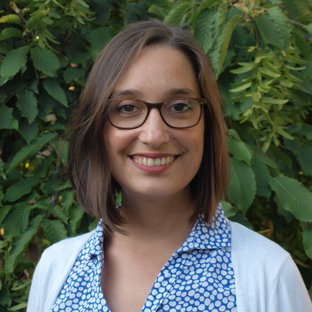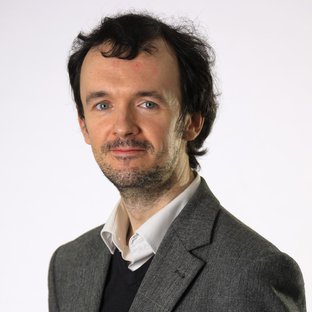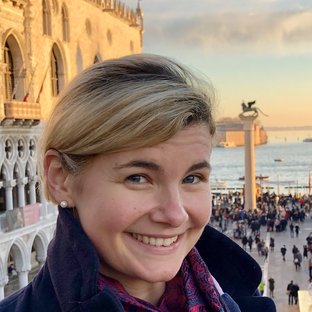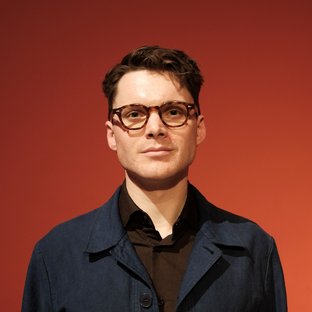Classics and Joint Schools
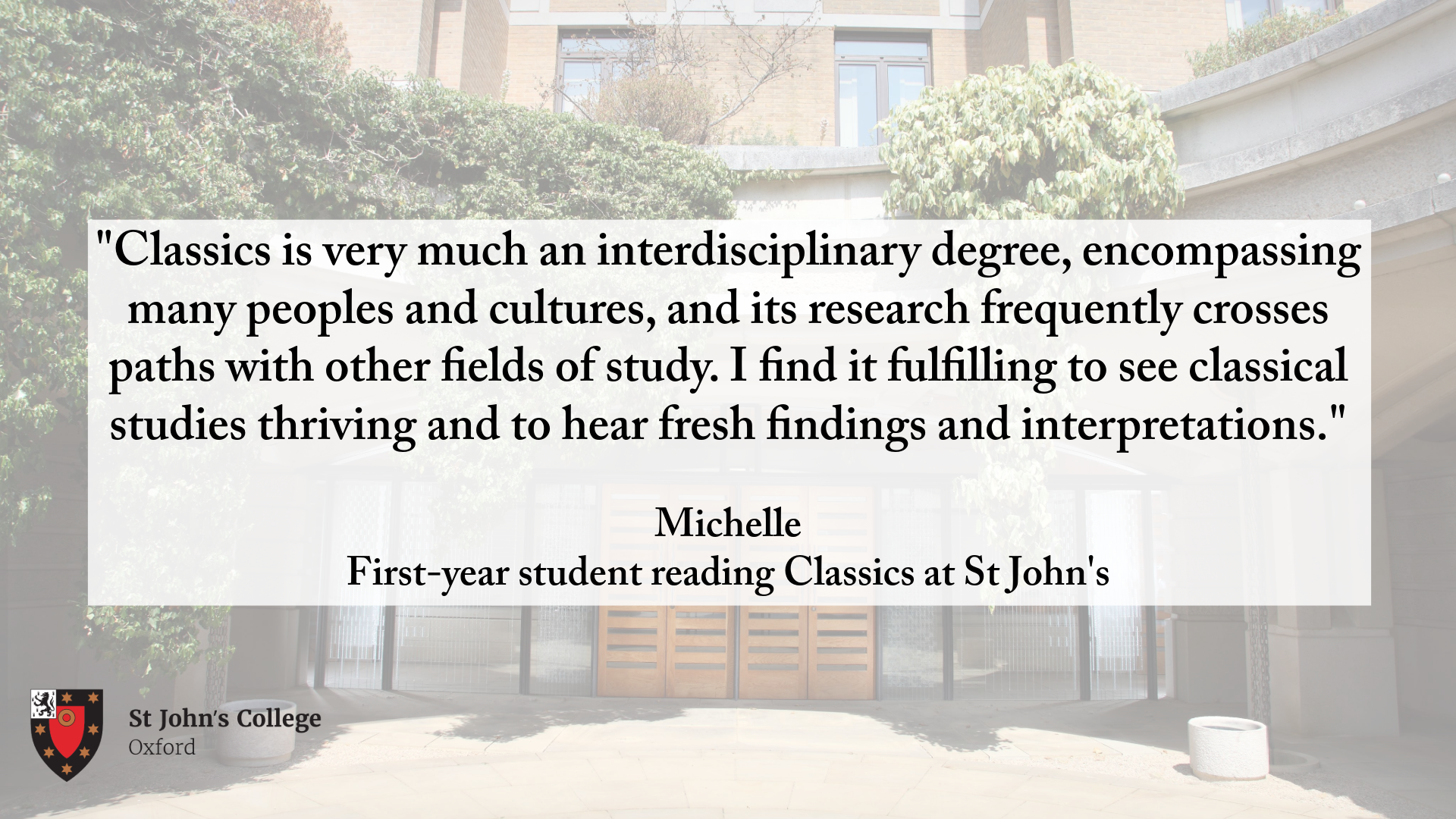
Average intake: 5
- Our students benefit from being part of the largest Classics Faculty in the world, as well as taking part in a dynamic interdisciplinary programme that combines the study of the literature, history, philosophy, and archaeology of the ancient Graeco-Roman world. We believe that Oxford’s huge resources in the form of libraries, museums and teachers make it the best place in the world to be studying Classics.
- The breadth of our Classics course is unique, allowing students to follow their interests not just in the classical periods of Greek and Roman literature and history, but in modern philosophy, history and archaeology of the Ancient Near East, or modern reception of classical literature, to name but a few possible subjects.
- At St John’s, we have tutors and lecturers in all fields of classical studies, whose research interests include such diverse subjects as post-classical Greek epic, effects of religious change on literary culture, Roman law and citizenship, Roman provincial government, Stoic philosophy, ancient logic, and Roman fresco paintings.
- Classics students at St John’s are part of a vibrant, sizeable group of students studying the Greek and Roman worlds, and share activities with those reading Ancient and Modern History, and Classical Archaeology and Ancient History. We also regularly admit for the joint schools with Modern Languages and Oriental Studies: combinations in recent years included Classics and Arabic, Classics and Egyptology, Classics and French, Classics and German, and many others. We also have a sizeable graduate community and provide a base for postdoctoral researchers.
- St John's is physically closest (literally just over the road) to the three most important buildings in the University for Classics: the Art, Archaeology and Ancient World Library (the world's largest classics library, also housing important papyri), the Ashmolean Museum (the UK's oldest, with important ancient sculpture and Greek vases), and the Classics Centre. We also have an excellent Classics collection in the College library, and a teaching numismatics collection.
- We have a unique link with the Ashmolean Museum, with our teaching post in classical archaeology combined with an assistant curatorship at the Department of Antiquities. Students benefit from regular handling sessions at the Museum.
- An active student Classics society is named after Professor Donald Russell (1920-2020), a distinguished Classical scholar and one of the Bletchley Park codebreakers, who has been teaching for the College from 1948 until the very last years of his life. It organises talks by distinguished academics, many of them St John’s alumni, every term.
- The College offers generous financial assistance for students in this subject to develop their first-hand experience in the field, through fieldwork, site- and museum-visits, and the study of ancient landscapes, particularly in the Mediterranean region. Our students have also benefitted from exchange programmes with other European universities.
- St John’s was the alma mater of some of the most important British classical scholars, including A.E. Housman (perhaps even more famous as a poet) and Gilbert Murray. Robert Graves (the author of I, Claudius) also started as St John’s as a Classicist before converting to English. The fictional Inspector Morse read Classics at St John’s too.
- Our Classics graduates have gone on to many diverse fields, including (besides academia, school teaching, and museum work) the civil service, law, finance, journalism, creative arts, social work, work for NGOs, and even computing: this list is not exhaustive! Six of our Classics alumni are Honorary Fellows of the College.
Read profiles from three St John's students studying Classics and Joint Schools here, here and here.
Watch a video from a Classics student at St John's:
Learn more about studying Classics and Joint Schools at St John's through the student profiles below.
Michelle is a first-year student reading Classics.

What A Levels (or equivalent) did you take?
Latin, Physics, Mathematics, English Literature
What inspired you to study at Oxford?
I think what attracted me most to Oxford was the strength and passion of the Classics Faculty, which, over time, has accumulated a wealth of resources devoted to the study of the ancient world. With such a strong classical background, Oxford was an obvious choice. The city itself is beautiful, from its libraries to its streets, and there is a historic depth to the place.
What do you like about studying at St John's?
St John’s has a warm and friendly environment, which makes studying here feel well-supported, both academically and socially. The grounds are quite vast, but not overwhelming, and there are many good study spaces — not only in the library and study centre, but also in Kendrew Café! The college lies close to the faculty and university libraries and has strong links with the Ashmolean Museum, we recently had the exciting opportunity to handle some artefacts closely related to a topic covered in one of our papers.
What aspects of your degree do you find particularly enjoyable or fulfilling?
Classics is very much an interdisciplinary degree, encompassing many peoples and cultures, and its research frequently crosses paths with other fields of study. I find it fulfilling to see classical studies thriving and to hear fresh findings and interpretations. I recently attended a lecture on Incan conceptualisations of the journey to the Other World and was surprised to see so much overlap — not only with Greco-Roman cultures but also with my own.
How does life in College compare to what you originally envisioned?
Student life in college is a lot more relaxed than I expected, social and academic life can blend together well. The student body is well-integrated through the many activities organised throughout the year, which is particularly helpful during Freshers' Week, as you get to know your cohort pretty quickly. This engagement between different student cohorts makes the college community feel more tight-knit and homely.
What do you do in your spare time?
I'm studying with a great group of Classicists. We've had film and pizza nights, and often go to see university productions of ancient plays. The Lamb and Flag is a great place for evening get-togethers, particularly at the end of the long term. If I'm not relaxing with friends, I like to keep up my swimming and play chess.
What advice would you give to someone hoping to study at Oxford?
Make sure enjoyment, intellectual curiosity, and passion are at the forefront of your learning. As I mentioned earlier, Classics is highly interdisciplinary, so simply attending a research seminar that isn't directly related to your field can offer a fresh evaluative perspective on your studies. Explore these intersections and see how they help your learning and critical thinking flourish. Oxford also trains you to be highly self-sufficient in managing your time, so make sure to have fun!
Amy is a second-year student reading Classics and German.

What A Levels (or equivalent) did you take?
German, Classical Civilisation, English Literature
What inspired you to study at Oxford?
Aside from the prospect of studying in an academically challenging institution which is world-renowned for my subjects, I was drawn to Oxford by the sense of community both within the degree subject and college. I felt I would meet lots of like-minded, friendly people here and that's definitely been the case.
What do you like about studying at St John's?
St John's has such a strong community, both academically and otherwise. You get to know people in your subject, through tutorials and classes, as well as socialising with them through events like subject dinners. On top of this, there are so many ways to get involved in college life, such as through the JCR, sports, taking part in plays and the annual arts week. As a result, there are always new people to get to know and spend time with. Overall, I think St John's students have a real sense of pride in their college, and everyone wants to do their bit to make it the best it can be.
What aspects of your degree do you find particularly enjoyable or fulfilling?
Doing a joint honours degree means access to two different academic worlds and all they have to offer, as well as getting to know people from both disciplines. Classics and German is the perfect synthesis of both the ancient and the modern, and easily encompasses all aspects of the humanities. It's an incredibly rich and rewarding area of study, with a great deal of variety - one day I might be poring over the intricacies of similes in Virgil's Aeneid, and the next, learning about the German political system in my speaking class. This degree definitely satisfies my detail-oriented brain, and allows me to explore languages and literature in a lot of depth.
At St John's, we also have the Russell society, which frequently holds guest lectures on a variety of Classics-related topics, often followed by a formal dinner in hall. These evenings are a great opportunity to chat to other Classics students, tutors and fellows, and there is always a generous amount of wine, which helps to keep the conversation flowing!
I will also be doing a year abroad in Germany in my fourth year, which I am really looking forward to.
How does life in College compare to what you originally envisioned?
Student life in college is a lot more relaxed than I expected, social and academic life can blend together well. The student body is well-integrated through the many activities organised throughout the year, which is particularly helpful during Freshers' Week, as you get to know your cohort pretty quickly. This engagement between different student cohorts makes the college community feel more tight-knit and homely.
What do you do in your spare time?
As I mentioned above, it's a lot more social than I realised! I'm always running into people in places like the college library and hall, as well as catching up at Tommy White tea and welfare lunches. This social element really helps, as it's quite easy to become a bit isolated when you're studying a lot.
For the academic side of things, my tutors are very friendly and helpful, and I always feel that I can approach them with any query I have. I was initially slightly intimidated by the idea of the tutorial, thinking that I would be put on the spot and would struggle to come up with things to say, however it is much more discussion-based and collaborative than I thought, and has become one of my favourite parts of studying here.
What advice would you give to someone hoping to study at Oxford?
Make sure you're really passionate about what you're going to study, since you'll be spending a lot of time on it each week. Aside from that, try reading up on topics which interest you, and enjoy this time spent getting to know your subject in more depth!
Samuel is a third-year student reading Classics and Asian and Middle Eastern Studies (Sanskrit)
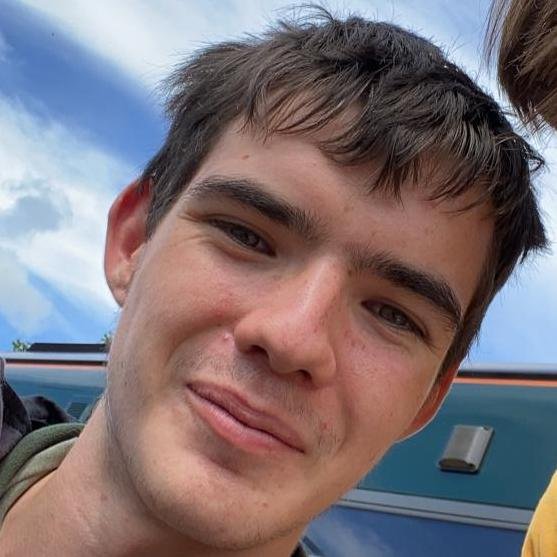
What A Levels (or equivalent) did you take?
Latin, Ancient Greek, Computer Science, Chemistry
What inspired you to study at Oxford?
Aside from the prospect of studying in an academically challenging institution which is world-renowned for my subjects, I was drawn to Oxford by the sense of community both within the degree subject and college. I felt I would meet lots of like-minded, friendly people here and that's definitely been the case.
What do you like about studying at St John's?
The college has such a strong sense of community, even between the years, probably because everyone lives onsite, but it’s also big enough that there’s enough space for everyone. The tutors are also amazing and always very supportive – and they have such depth of knowledge in the most niche of topics (and joy in sharing it) that it’s impossible not to enjoy a tutorial with them (though I have never finished a tutorial without feeling like my head has been put into a large blender, which is somehow the best feeling in the world!).
There's also free printing!
What aspects of your degree do you find particularly enjoyable or fulfilling?
I really enjoy the amount of literature I’ve read in the original language. It’s a very satisfying feeling to read a passage in a dead language and the Oxford system is designed to allow you to read as much as possible in the original. Both the Classical and the Sanskrit halves of my course are heavily focused on the languages and literature, which is not to say that history and archaeology do not play an important part in both courses. The Classics course especially is heavily adaptable to the student’s interests, whether they are in philosophy, literature, archaeology, history, or even linguistics!
How does life in College compare to what you originally envisioned?
I didn’t really know what to expect when I first came to Oxford – it’s incredibly unlike anywhere I’d ever been! I certainly did not expect the college gardens to be so large, or so luxuriant – there’s such a wonderful diversity of plants within their walls that they make an excellent diversion from the pressures of the day. I was also pleasantly surprised by how easy it was to find people who share similar passions to you, even within the same staircase!
One thing that did throw me off at first was the language that the University uses for so many things – e.g. battels for bills, or Mods/Greats for the two stages of the Classics and CAMES courses. However once you get used to these terms they come naturally!
What do you do in your spare time?
Oxford has a really strong dramatic scene, which is really welcoming to newcomers and novices of all abilities and experiences. Over the last few years, I’ve gotten involved in musical parodies of Doctor Who, Gilbert and Sullivan operas, and plays written by other students. It’s also great fun to go and see other student productions – especially if your friends are in them! I also help run the college’s fibre arts society, which provides a much needed weekly space to relax, knit, and gossip!
What advice would you give to someone hoping to study at Oxford?
The workload is intense and can be overwhelming at times, so it is important to work hard and make the most of the amazing opportunities you have access to when you’re at Oxford.
